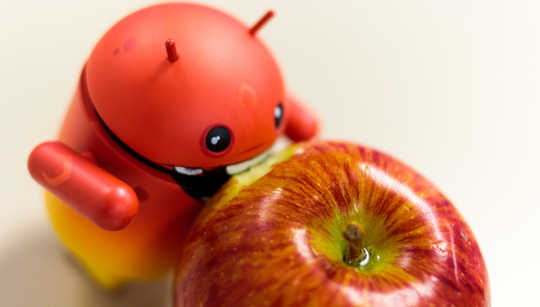 A ‘natural’ apple? This robot doesn’t care. Aidan, CC BY
A ‘natural’ apple? This robot doesn’t care. Aidan, CC BY
Whether commanding the attention of rock star Neil Young or apparently being supported by the former head of Greenpeace, genetically modified food is almost always in the news – and often in a negative light.
GM divides opinion, and even individual people can find themselves pulled in two different ways. On the one hand it is a largely new technology and new tech often brings prosperity, solves problems and offers hope for the future. But this also makes it a step into the unknown and people are frightened of what they do not know, or what cannot be known.
In a study recently published in the journal Appetite, colleagues and I examined why some people reject GM technology. We were neither arguing for nor against GM, but rather we wanted to look at the characteristics which determine people’s views.
Specifically, we examined attitudes in the EU to two different types of genetic modifications made to apples. Both involve the introduction of genes to make them resistant to mildew and scab. The first is a gene that exists naturally in wild/crab apples. This is an example of what is called “cisgenesis”. In the second one the gene is from another species such as a bacterium or animal, and is an example of “transgenesis”.
Get The Latest By Email
As an idea of the gains available from this process, the production of a new apple cultivar may take 50 years or more. Gene transfer technologies can substantially shorten this. At the same time they may introduce characteristics from totally alien species which is virtually impossible to do naturally. This may then introduce many desirable qualities into the apple – for instance, in the hypothetical case we are analysing, the apples were made more resistant to disease.
We found people’s attitudes tend to be driven by their fears of risk, and their hopes of gain, with hopes being more important for cisgenesis (introduced genes from other apples) and the former for transgenesis (genes from other species).
But quite separate to risk and gain are perceptions that the technologies are “not natural”. Evidently people are disturbed when science takes us away from what they see as the laws of nature. People are also concerned about environmental impact.
Digging Into The Data
Our data is based on a Eurobarometer survey carried out in 2010 of 15,650 people from around the EU. In general people seem to be more hesitant about transgenesis, than cisgenesis (apple to apple gene transfer). Thus 57.1% of respondents wished to see cisgenesis encouraged compared to just 31.4% for transgenesis. Clearly people are more worried about having animal genes in their apples, compared to genes from wild apples.
Attitudes are not spread randomly across the population. Rather there are systematically different views dependent on gender, level of education, home background, whether in a village or a large town and across different countries.
Men are significantly more likely to support cisgenesis, for example, as are better educated and more prosperous people. Religion is also important and Muslims, Catholics and Orthodox Christians are significantly less approving than the general population.
People are more united in their disapproval of transgenesis (adding genes from other species). But, again, more educated people tend to be more approving as do men and the more prosperous, while older people tend to be more wary. Finally, for both technologies studying science, or having a father who studied science, impacted favourably on attitudes.
Some figures show the impact of religion: compared to the 31.4% who approved of transgenesis overall, just 23.3% of Orthodox Christians did so. The situation is reversed for cisgenesis with 57.1% approving overall, but Greek Orthodox Christians now more supportive with 60.9% approving. It is now Muslims who are substantially less supportive with only 40.6% approving.
This is an example of how religious diversity leads to differing opinions on new technologies. Thus if a government wishes to encourage GM technology, it might give some thought to opening up dialogue with religious leaders.
The Great GM Catch-up
The EU is one of the world’s toughest places to gain approval for GM crops, in part because of these concerns expressed by its citizens. This has resulted in the EU falling behind other countries.
The more positive attitudes of scientists and better educated people may suggest wariness of GM foods is simply driven by ignorance. Increasing knowledge and understanding would help reduce this, but there may be limits – in reality few of us are fully able to evaluate the relevant technical arguments. Hence we tend to rely on the opinions of those we trust, religious leaders in some cases, experts, scientists and governments in others.
The evidence is that people are more supportive and less concerned with cisgenesis than transgenesis. This perhaps makes sense as many in the sample perceived apples crossed with genes from other apples as more “natural” than apples crossed with something else. If from the outset these had been separately labelled, then it is possible the EU would have been quicker to give the green light to cisgenesis.
On the other hand treating them all as one and the same increases the possibility that the green light will eventually be given to all GM products, cisgenesis and transgenesis alike. It is an example of the dangers of placing disparate technologies in a single basket and saying: take it or leave it.
About The Author
 John Hudson is Professor in Economics at University of Bath. His publications span a wide range of areas including bankruptcies, inflation, unemployment, the impact of development aid, standardisation, taxation, altruism as well as the politico-economic interface.
John Hudson is Professor in Economics at University of Bath. His publications span a wide range of areas including bankruptcies, inflation, unemployment, the impact of development aid, standardisation, taxation, altruism as well as the politico-economic interface.
This article was originally published on The Conversation. Read the original article.







